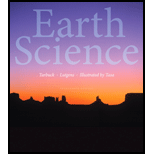
a)
Whether the new measurements lead to more accurate calculation if Erathosthenes had measured the difference in the angles of the noonday sun between Syene and Alexandria to be 10 degrees instead of 7 degrees with reference to Figure 21.3 in the textbook.
a)
Answer to Problem 1GST
Although Erathosthenes measured the difference in the angles of the noonday sun between Syene and Alexandria to be 10 degrees instead of 7 degrees that would not be an accurate calculation.
Explanation of Solution
Erasthosthenes (276-194 B.C.E) is the one who successfully attempted to establish the size of the Earth. His calculations were very close to the modern values.
Erasthosthenes calculated the angles of the noon day sun at two different Egyptian cities, namely Syene and Alexandria. They were roughly north and south of each other. He identified that the difference between the two angles is 7 degrees or 1/50 of a circle.
Therefore, he described the circumference of the Earth would be 50 times the distance between the two cities. He calculated the Earth’s circumference as 39,400 kilometers and the modern value of circumference is 40,075 kilometers.
b)
Whether the new measurements lead to an estimate for the circumference of the Earth that is larger or smaller than the original Erathosthenes’ estimates.
b)
Answer to Problem 1GST
As the angle increases to 10 degrees, it is 1/36 of a circle. Hence, the circumference of the Earth would be 36 times the distance between the two cities. Thus, the new measurements lead to an estimate for the circumference of the Earth, which is smaller than the original Erathosthenes’ estimates.
Explanation of Solution
Erasthosthenes calculated the angles of the noon day sun at two different Egyptian cities, namely Syene and Alexandria. They were roughly north and south of each other. He identified that the difference between the two angles is 7 degrees or 1/50 of a circle.
Therefore, he described that the circumference of the Earth would be 50 times the distance between the two cities. He calculated the Earth’s circumference as 39,400 kilometers and the modern value of circumference is 40,075 kilometers.
Want to see more full solutions like this?
Chapter 21 Solutions
Earth Science (14th Edition)
 Applications and Investigations in Earth Science ...Earth ScienceISBN:9780134746241Author:Edward J. Tarbuck, Frederick K. Lutgens, Dennis G. TasaPublisher:PEARSON
Applications and Investigations in Earth Science ...Earth ScienceISBN:9780134746241Author:Edward J. Tarbuck, Frederick K. Lutgens, Dennis G. TasaPublisher:PEARSON Exercises for Weather & Climate (9th Edition)Earth ScienceISBN:9780134041360Author:Greg CarbonePublisher:PEARSON
Exercises for Weather & Climate (9th Edition)Earth ScienceISBN:9780134041360Author:Greg CarbonePublisher:PEARSON Environmental ScienceEarth ScienceISBN:9781260153125Author:William P Cunningham Prof., Mary Ann Cunningham ProfessorPublisher:McGraw-Hill Education
Environmental ScienceEarth ScienceISBN:9781260153125Author:William P Cunningham Prof., Mary Ann Cunningham ProfessorPublisher:McGraw-Hill Education Earth Science (15th Edition)Earth ScienceISBN:9780134543536Author:Edward J. Tarbuck, Frederick K. Lutgens, Dennis G. TasaPublisher:PEARSON
Earth Science (15th Edition)Earth ScienceISBN:9780134543536Author:Edward J. Tarbuck, Frederick K. Lutgens, Dennis G. TasaPublisher:PEARSON Environmental Science (MindTap Course List)Earth ScienceISBN:9781337569613Author:G. Tyler Miller, Scott SpoolmanPublisher:Cengage Learning
Environmental Science (MindTap Course List)Earth ScienceISBN:9781337569613Author:G. Tyler Miller, Scott SpoolmanPublisher:Cengage Learning Physical GeologyEarth ScienceISBN:9781259916823Author:Plummer, Charles C., CARLSON, Diane H., Hammersley, LisaPublisher:Mcgraw-hill Education,
Physical GeologyEarth ScienceISBN:9781259916823Author:Plummer, Charles C., CARLSON, Diane H., Hammersley, LisaPublisher:Mcgraw-hill Education,





